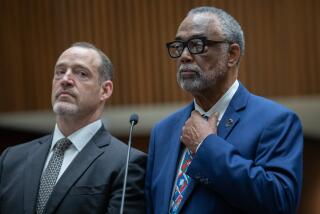L.A. City Council candidate sues to stop former ethics commissioner from running

A West Hills man running for a spot on the Los Angeles City Council is suing the city to remove one of his opponents from the ballot, claiming that she is legally barred from running under “revolving door” rules.
Frank Ferry, an attorney and educator who formerly served on the Santa Clarita City Council, argued in his suit that Serena Oberstein cannot run for the seat because she recently served on the city Ethics Commission.
Under the city charter, ethics commissioners cannot seek election for two years after their terms to any city office “concerning which the commission has made a decision” while they served.
Oberstein stepped down from the Ethics Commission in November to run in a council district that includes the northwestern San Fernando Valley neighborhoods of Granada Hills, Chatsworth and Porter Ranch. Sixteen people, including Oberstein, have qualified to run in a June special election to fill the seat vacated by Mitchell Englander.
In reaction to questions about the city charter rule, Oberstein said that a lawyer in the city attorney’s office told her she was not prohibited from running for the seat because ethics commissioners have a largely “advisory role.”
That advice was given by that attorney in a “personal capacity,” according to her campaign consultant Maclen Zilber. In addition, Zilber said that Oberstein had consulted with Ethics Commission Executive Director Heather Holt, who then got informal advice from the city attorney’s office about her eligibility.
“As Ethics Commission chair, I did my due diligence prior to deciding whether or not to run by checking with counsel and the Ethics Commission to ensure that everything I am doing is by the book,” Oberstein said in a statement.
The city attorney’s office confirmed that it provided advice to Holt, the commission’s executive director, but declined to provide further details. An Ethics Commission spokeswoman did not respond to repeated questions about whether staffers had advised Oberstein that she was eligible.
Ferry argued that under the city charter, Oberstein was plainly barred from being a candidate until November 2020. While sitting on the Ethics Commission, Oberstein recommended changes to a city program that provides taxpayer money to city candidates and voted to approve fines against former candidates who had run for office in the same district.
“When an ethics commissioner can say, ‘The laws don’t apply to me,’ that’s why people become jaded about public service,” Ferry said.
“I don’t have any animosity towards her,” Ferry added. “I am really just looking at the enforcement of the rule.”
Oberstein fired back in a statement Tuesday denouncing the “reckless” suit, saying that “it’s clear that the good ol’ boys club and downtown City Hall special interests are afraid of an ethics watchdog and another woman on the City Council.” Being able to seek public office, she said, is “a fundamental right essential to democracy.”
“Simply put — this lawsuit is attempting to silence, marginalize and discriminate against our campaign.… I say, bring it on,” Oberstein said.
As a candidate, Oberstein has spotlighted her credentials as the former president of the Ethics Commission, saying she will work to root out corruption as City Hall faces an ongoing FBI probe. Representatives of the Oberstein campaign have emphasized that she has been able to file paperwork to run for the seat without city staff blocking her candidacy.
City Clerk Holly Wolcott declined to comment on what advice her office had gotten on Oberstein from city attorneys, but said that in general, “an individual running for office will be placed on the ballot if he or she meets all of the qualification criteria: is a minimum of 18 years old, a registered voter, lives in the district, and meets the petition requirements.”
“If someone would like to challenge a person … or anything else regarding a ballot, they must get a court ruling,” Wolcott said in a statement.
Ferry argued in his lawsuit that the city and the county had enough time to remove Oberstein from the ballot, since he had been informed that the deadline for printing those materials was March 28.
In a court filing Tuesday, city attorneys said Ferry was putting forward an interpretation of the charter that was “overbroad and inconsistent with both the plain language of the charter and its legislative history.”
The charter section “is meant to preclude members of the Ethics Commission from making a decision about a particular official or incumbent in office, and subsequently running against that official,” the city attorneys wrote.
A court hearing in the case is planned for Wednesday morning.
Twitter: @AlpertReyes
More to Read
Start your day right
Sign up for Essential California for news, features and recommendations from the L.A. Times and beyond in your inbox six days a week.
You may occasionally receive promotional content from the Los Angeles Times.







